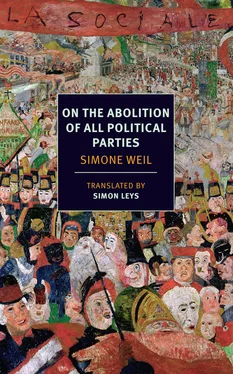Such words would not be welcome. His comrades and even many other people would accuse him of betrayal. Even the least hostile would say, ‘Why then did he join a political party?’ — thus naively confessing that, when joining a political party, one gives up the idea of serving nothing but the public interest and justice. This man would be expelled from his party, or at least denied pre-selection; he would certainly never be elected.
Furthermore, it seems inconceivable that anyone would dare to utter such words. In fact, if I am not mistaken, such a thing has never happened. If such language has ever been used, it was only by politicians who needed to govern with the support of other parties. And even then, the words had a somewhat dishonourable ring to them. Conversely, everybody feels that it is completely natural, sensible and honourable for someone to say, ‘As a conservative…’ or ‘As a Socialist, I do think that…’
Actually, this sort of speech is not limited to partisan politics; people are not ashamed to say, ‘As a Frenchman, I think that…’ or ‘As a Catholic, I think that…’
Some little girls, who declared they were committed to Gaullism as the French equivalent of Hitlerism, added: ‘Truth is relative, even in geometry.’ Indeed, this is the heart of the matter.
If there were no truth, it would be right to think in such or such a way, when one happens to be in such or such a position. Just as one’s hair is black, brown, red or blond because one happened to be born that way, one may also express such or such a thought. Thought, like hair, is then the product of a physical process of elimination.
If, however, one acknowledges that there is one truth, one cannot think anything but the truth. One thinks what one thinks, not because one happens to be French or Catholic or Socialist, but simply because the irresistible light of evidence forces one to think this and not that.
If there is no evidence, if there is doubt, then it is evident that, given the available knowledge, the matter is uncertain. If there is a small probability on one side, it is evident that there is a small probability — and so on. In any case, inner light always affords whoever seeks it an evident answer. The content of the answer may be more or less affirmative — never mind. It is always susceptible to revision, yet no correction can be effected unless it is through an increase of inner light.
If a man, member of a party, is absolutely determined to follow, in all his thinking, nothing but the inner light, to the exclusion of everything else, he cannot make known to the party such a resolution. To that extent, he is deceiving the party. He thus finds himself in a state of mendacity; the only reason why he tolerates such a situation is that he needs to join a party in order to play an effective part in public affairs. But then this need is evil, and one must put an end to it by abolishing political parties.
A man who has not taken the decision to remain exclusively faithful to the inner light establishes mendacity at the very centre of his soul. For this, his punishment is inner darkness.
It would be useless to attempt an escape by establishing a distinction between inner freedom and external discipline, for this would entail lying to the public, towards whom every candidate, every elected representative, has a special duty of truthfulness. If I am going to say, in the name of my party, things which I know are the opposite of truth and justice, should I first issue a warning to that effect? If I don’t, I lie.
Of these three sorts of lies — lying to the party, lying to the public, lying to oneself — the first is by far the least evil. Yet if belonging to a party compels one to lie all the time, in every instance, then the very existence of political parties is absolutely and unconditionally an evil.
In advertisements for public meetings, one frequently reads things like this: ‘Mr X will present the Communist point of view (on the issue which the meeting shall address). Mr Y will present the Socialist point of view. Mr Z will present the Liberal point of view.’
How do these wretches manage to know the various points of view they are supposed to present? Who can have instructed them? Which oracle? A collectivity has no tongue and no pen. All the organs of expression are individual. The Socialist collectivity is not embodied in any person, and neither is the Liberal one. Stalin embodies the Communist collectivity, but he lives far away and it is not possible to reach him by telephone before the meeting.
No, Mr X, Mr Y, Mr Z each consulted themselves. Yet, if they were honest, they would first have put themselves in a special psychological state — a state similar to the one which is usually attained in the atmosphere of Communist, Socialist or Liberal gatherings.
If, having put oneself in such a state, one were to abandon oneself to automatic reactions, one would quite naturally speak a language in full conformity with the Communist, Socialist or Liberal ‘point of view.’ To achieve this result, there is but one condition: one must absolutely resist the contemplation of truth and justice. If such contemplation were to take place, one would run a horrible risk: one might express a ‘personal point of view.’
When Pontius Pilate asked Jesus, ‘What is the truth?’ Jesus did not reply. He had already answered when he said, ‘I came to bear witness to the truth.’
There is only one answer. Truth is all the thoughts that surge in the mind of a thinking creature whose unique, total, exclusive desire is for the truth.
Mendacity, error (the two words are synonymous), are the thoughts of those who do not desire truth, or those who desire truth plus something else. For instance, they desire truth, but they also desire conformity with such or such received ideas.
Yet how can we desire truth if we have no prior knowledge of it? This is the mystery of all mysteries. Words that express a perfection which no mind can conceive of — God, truth, justice — silently evoked with desire, but without any preconception, have the power to lift up the soul and flood it with light.
It is when we desire truth with an empty soul and without attempting to guess its content that we receive the light. Therein resides the entire mechanism of attention.
It is impossible to examine the frightfully complex problems of public life while attending to, on the one hand, truth, justice and the public interest, and, on the other, maintaining the attitude that is expected of members of a political movement. The human attention span is limited — it does not allow for simultaneous consideration of these two concerns. In fact, whoever would care for the one is bound to neglect the other.
Yet no suffering befalls whoever relinquishes justice and truth, whereas the party system has painful penalties to chastise insubordination. These penalties extend into all areas of life: career, affections, friendship, reputation, the external aspect of honour, sometimes even family life. The Communist Party developed this system to perfection.
Even for those who do not compromise their inner integrity, the existence of such penalties unavoidably distorts their judgment. If they try to react against party control, this very impulse to react is itself unrelated to the truth, and as such should be suspect; and so, in turn, should be this suspicion… True attention is a state so difficult for any human creature, so violent, that any emotional disturbance can derail it. Therefore, one must always endeavour strenuously to protect one’s inner faculty of judgment against the turmoil of personal hopes and fears.
If a man undertakes extremely complex numerical calculations knowing that he will be flogged every time he obtains an even number as the final result, he finds himself in an acute predicament. Something in the sensual part of his soul will induce him each time to give a slight twist to the calculations, in order to obtain an odd number at the end. His wish to react may indeed lead him to find even numbers where there are none. Caught in this oscillation, his attention is no longer pure. If the complexity of the calculations demands his total attention, inevitably he will make many mistakes — even if he happens to be very intelligent, very brave and deeply attached to the truth.
Читать дальше












